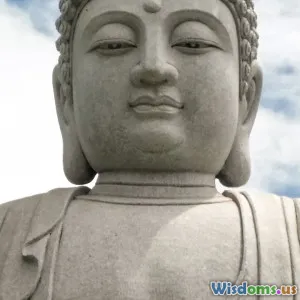
Philosophy as a Path to Self Discovery
8 min read Explore how philosophy serves as a profound journey toward self-discovery and personal growth. (0 Reviews)
Philosophy as a Path to Self Discovery
Philosophy, often perceived as an abstract discipline confined to dusty books and academic debates, holds a far more intimate and transformative power. It is, at its core, a profound pathway to knowing oneself — a journey that blends rigorous inquiry, spiritual depth, and an enduring quest for meaning. In this article, we explore philosophy not just as an intellectual pursuit but as a practical guide for personal growth and self-realization.
Introduction: A Call to Inner Exploration
In a fast-paced world dominated by external achievements and distractions, the question "Who am I?" remains eternally compelling yet often overlooked. Philosophy invites us to pause and embark on a voyage beneath our surface identities. This voyage transcends fleeting labels and social roles, focusing instead on the essence of our being.
Consider Socrates’ famous dictum, “Know thyself.” This ancient counsel is not mere advice but a rallying cry to start an inward quest marked by questioning, reflecting, and evolving. Far from being a mysterious or elite exercise, self-discovery through philosophy is accessible to anyone willing to delve deep with honest curiosity.
The Philosophical Foundations of Self Discovery
The Role of Critical Thinking
Philosophy trains the mind to question assumptions. By rigorously analyzing beliefs about oneself, we uncover biases and illusions.
For example, Descartes’ methodic doubt—questioning every belief until arriving at something undeniable—uncovers a cornerstone of self-knowledge: “I think, therefore I am.” Here, the act of doubting confirms the thinker’s existence, a pivotal insight into individual identity.
This ability to interrogate one’s worldview leads to profound insights and greater psychological resilience. Instead of blindly accepting inherited or cultural notions about the self, philosophy empowers individuals to construct authentic self-understanding.
Ethical Reflection and Personal Identity
Philosophical ethics encourages us to reflect on what values truly resonate with us. Questions like "What kind of person do I want to be?" and "What does living well mean?" act as mirrors, allowing for conscious alignment between our actions and deepest aspirations.
The existentialists, particularly Jean-Paul Sartre and Simone de Beauvoir, emphasize that we are not defined by given essences but by our choices. This means that self-discovery is an ongoing project of authorship and freedom. Embracing this freedom—despite the attendant anxiety—affirms the individual's capacity for meaningful change.
Practical Applications: Philosophy Meets Daily Life
Mindfulness and Stoicism
Many ancient philosophies provide practical tools for navigating life while maintaining self-awareness. Stoicism, a tradition championed by Marcus Aurelius and Seneca, teaches the importance of distinguishing what is within our control (our thoughts, attitudes) from what is not (external events).
When practicing Stoic meditation, individuals learn to observe their reactions, cultivating inner mastery and emotional equanimity. This practice fosters a deeper understanding of the self, untethered from external validation or turmoil.
Similarly, mindfulness — influenced by Buddhist philosophy — enhances self-awareness by advocating non-judgmental attention to the present moment. This attentiveness helps uncover habitual patterns and unconscious tendencies embedded in our psyche.
Dialogues and Socratic Questioning
Engaging in dialogue remains a timeless method for self-discovery. The Socratic method employs persistent questioning to reveal underlying beliefs and contradictions.
This practice can be employed in therapy, coaching, and everyday relationships to clarify personal values and dismantle limiting narratives.
For example, asking “Why do I believe this about myself?” or “What evidence supports this self-judgment?” can challenge destructive self-concepts and lead to empowering self-knowledge.
Spiritual Dimensions: Philosophy Beyond Reason
Philosophy also intersects with spirituality by addressing metaphysical questions about existence, consciousness, and transcendence. Notable philosophers such as Plotinus and Novalis integrated spiritual insight with rational exploration.
Philosophy enables individuals to grapple with mysteries beyond empirical facts, encouraging humility and awe. Spiritual traditions often embrace philosophical inquiry as a discipline of self-awareness, blending intellectual appraisal with experiential wisdom.
For instance, the concept of Atman in Vedanta philosophy invites seekers to identify their true self beyond ego and illusion. This aligns philosophically with the idea of the "inner subject" and resonates deeply on a spiritual plane.
These explorations enrich self-discovery by expanding it from self-definition toward realizing interconnectedness and universality.
The Transformative Power of Philosophy: Real-World Insights
Philosophy’s impact is evident across diverse stories and disciplines:
-
Literature and Art: Writers like Milan Kundera and Hermann Hesse use philosophical themes to explore identity and existential struggle, illustrating self-discovery as a dynamic narrative.
-
Psychology: Philosophical inquiry informs methods like existential psychotherapy, which prioritize meaning-making and freedom.
-
Science: Figures such as Carl Jung emphasize the importance of exploring the unconscious, heavily influenced by philosophical ideas about the self.
Moreover, contemporary thinkers like Martha Nussbaum advocate for philosophy’s role in developing emotional intelligence, empathy, and citizenship — essential components of authentic selfhood.
Conclusion: Philosophy as an Ever-Unfolding Journey
The path of philosophy as a means of self-discovery is not a finite destination but a continuous unfolding. It invites us to live deliberately, question deeply, and embrace the unknown parts within.
By combining critical thinking with ethical reflection and spiritual openness, philosophy provides a comprehensive framework to understand the self in its full complexity.
Whether through embracing skepticism, engaging in dialogue, or meditative practice, philosophy enriches the timeless quest to "know thyself." In doing so, it empowers each of us to cultivate a more genuine, fulfilling, and enlightened existence.
Take Action: Try incorporating daily reflective questions inspired by philosophy—such as "What assumptions am I making about myself today?" or "What values am I living out?" —to initiate your own path toward self-discovery.
Remember, the journey inward is among the most rewarding of all.
References:
- Plato, "Apology"
- René Descartes, "Meditations on First Philosophy"
- Marcus Aurelius, "Meditations"
- Jean-Paul Sartre, "Being and Nothingness"
- Viktor Frankl, "Man’s Search for Meaning"
- Martha Nussbaum, "Upheavals of Thought"
Rate the Post
User Reviews
Popular Posts




















